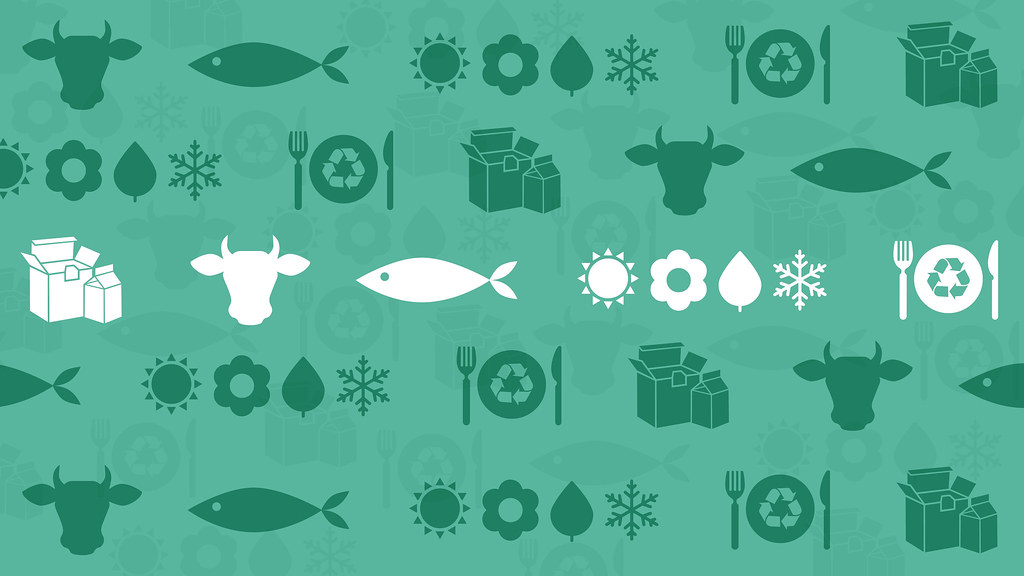Building on the decade-long work of Hospitality, Retail and Student Living to reduce the environmental impact of food provision on campus, our new Sustainable Food Commitment (SFC) has been approved at the University Executive Board. This refocuses our efforts on those activities with the largest climate impacts.
The five new areas of focus are:
- Using more seasonal food and locally-produced food when it has a lower climate/carbon impact. Sometimes it is more efficient to import food when in season elsewhere, instead of using large quantities of energy to grow it locally. For example during winter it is less carbon intensive to import tomatoes from Spain instead of growing them in the UK.
- Sustainably sourced fish. Hospitality outlets will only source fish from species identified by the Marine Stewardship Council with higher sustainability ratings.
- Reducing food waste. Around one third of food in the world is wasted every year, mostly at the end of the supply chain. This is often driven by excessive portion sizes, and wasteful sales practices.
- Minimising packaging. Packaging plays an important role in protecting food as it moves through the supply chain, but it also has negative environmental impacts. We will only use packaging where it is needed, focusing first on minimising packaging, and then prioritising plastic reduction.
- Reducing meat and in particular ruminant meat consumption. This is by far the single largest action we can take to reduce our carbon footprint from food.
Our new SFC webpage provides more detail behind the SFC and will chart our journey towards achieving these commitments over time.
Pete Phelps, Climate Action Project Lead, said:
In line with our approach to our climate action this is a whole institution approach, and we will work to address these commitments not only in our eateries but also retail, hospitality, and catered events.
We won’t achieve these commitments overnight, but we do have a detailed action plan which lays out our journey to reach these goals.
We know that different areas of the University will make progress at different speeds. Where we have the most control over the food sold (e.g., in our eateries) expect to see changes here first, whilst progress will be slower in other areas where we have less influence – for instance over ingredients in products supplied pre-prepared.
I want to thank all those who have been involved in getting the Sustainable Food Commitment ready to launch – including the students who worked on Vertically Integrated Projects on food provision, academic colleagues, and colleagues from ahs and the Climate Action Team.
Jane Loveys, Director of Campus Services , said:
ahs have been working to reduce the University’s environmental impacts for over a decade. To date these efforts have primarily focused on reducing waste and single use plastic and buying Fair Trade products. So far, the use of more than 60,000 disposable cups has been avoided, food waste has been significantly reduced, whilst tonnes of food has been donated, and crockery re-used through the “Leave no Trace” campaign.
Single use plastic cups, plastic straws and plastic cutlery has been removed and the University only procures Fairtrade, Rainforest Alliance, and Organic certified barista coffee. The grounds of this coffee are recycled throughout the University estate.
The Market retail store was introduced in 2021 and is committed to supporting natural, sustainable, ethical, and inclusive products and suppliers which serve our community. Over the last year we have ranged and promoted over 400 plant-based products, showcased over 250 local products from the South West region, and introduced our zero waste range facilitating the reduction of both plastic packaging and food waste by enabling our customers to weigh and pay only for what they need.
We are now excited about working on the next stage of this journey, and through our work on the SFC we want to make it easy for our community to choose climate-friendly meals on campus, whilst still offering a range of tasty choices of course.
The Climate Action Team recently launched a blog series exploring in detail the results of our first Annual Climate Action survey and the University’s action in the specific areas we asked our community about. A recent blog in this series looks at the topic of diets, exploring some of the complexity behind the emissions associated with beef and lamb, and the extent to which our community are already embracing sustainable food choices.
Viktor Toshev, Students’ Union Activities Officer said:
I am so excited that the Sustainable Food commitment has been established. It is our duty as the next generation to take action to protect the environment and its resources, and I truly believe that the SFG is a significant step in the right direction.
Minimising packaging and food waste, as well as carefully selecting our food suppliers, will help the university leave a smaller environmental footprint and contribute to reducing our emissions, in line with our 2030 carbon targets.
It also warms my heart to see that the opinions and ideas expressed by students during the Citizens Assembly in November 2021 were taken into account and used in the development of the Sustainable Food Commitment. Many thanks to the University and its administration for taking action on four topics discussed in the assembly that were related to food and its supply chain. The SU is looking forward to collaborating with the university and its students on this campaign and similar ones in the future.
A SFC Working Group has been established to monitor and challenge progress on our action plan. Meeting every three months, this group will have expert student, academic, climate action and ahs representation.
The group will also report annually on progress towards these commitments, so our community can understand how, why and at what speed, change is taking place.
For more information on University activity around Climate Action and how you can get involved click here.

